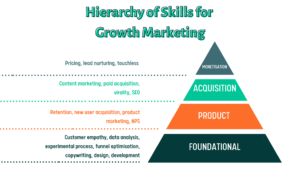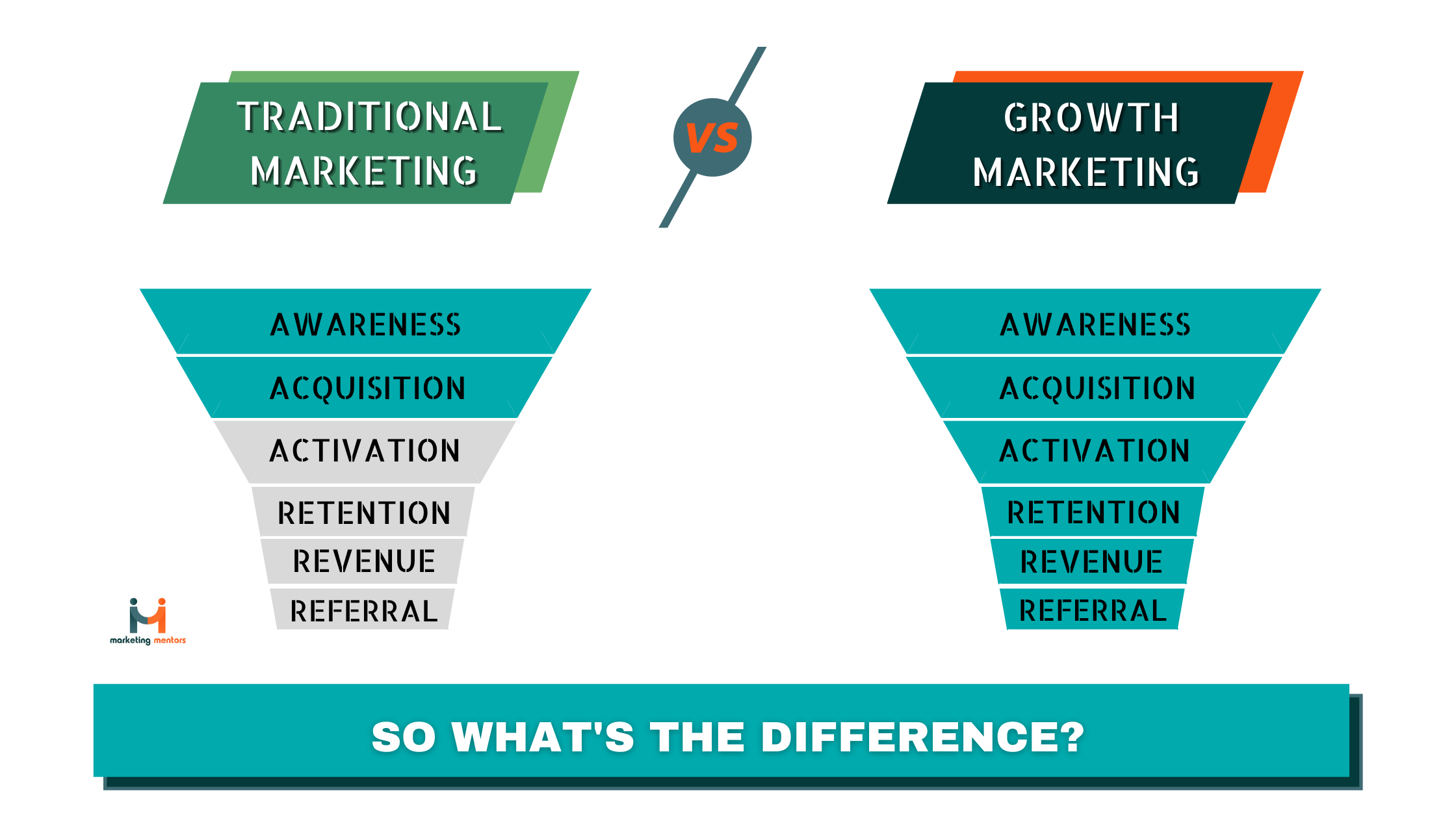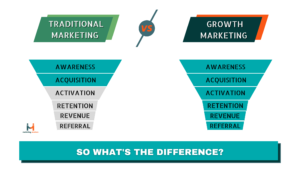Why Growth Marketing IS the solution for Startups & Scaleups!
We refer to our Marketing Mentors as “growth marketers” and you will be hearing a lot about Growth Marketing and Growth Hacking going forward….BUT what do these terms even mean really? Aren’t all marketers ‘growth marketers’?
I will attempt to explain the difference between Growth Marketing versus Traditional Marketing and show you how as a Startup or Small Business you can use it to your advantage!
What is Growth Marketing?
Growth Marketing focuses on using creative, low-cost strategies to help businesses acquire and retain customers.
Growth Marketing is an approach to attracting, engaging, and retaining customers that’s focused on relentless experimentation and an intense focus on the unique, changing motives and preferences of your customers. By building and delivering highly tailored, individualised messaging aligned to your customer’s needs, you’ll be able to optimise your organisation’s growth rapidly through a multitude of channels, especially the ones that matter most to your customers.
As marketing technology has advanced, so has the sophistication of the growth marketing field. Growth marketers are using A/B testing and multivariate testing to develop experiments around what and when content is seen, by different user segments. It uses the results to develop highly optimised strategies for each identified user segment, going down to the individual level.
Growth marketing focuses on customer relationship building and fostering loyalty; it’s a long-term strategy where authenticity and engagement create advocacy and organically grows customer lifetime values.
The term itself was coined by entrepreneur Sean Ellis in 2010 when he was seeking an employee for a new marketing role. He wasn’t looking for a traditional marketer who would be concerned with factors such as cost-per-acquisition. His main focus was, how can I grow my user base as quickly as possible? This question was a central concern for SaaS startups, which needed to outpace their competitors or die.
Fast forward one decade, growth marketing has evolved past the “get-growth-quick” tactics of growth hacking. However, that doesn’t mean successful elements of its rise to success have been forgotten. Growth marketing continues leaning into its testing, experimentation, and expansion roots and applies these principles to campaigns throughout the customer journey.
Growth Marketing versus Traditional Marketing
Growth marketing differs from traditional marketing in that it focuses on the entire customer funnel and not just the top of the funnel.
Traditional marketing
Traditional marketing often relies on the same tried-and-true techniques for reaching customers. Hold a sale, send out an email blast, run a Google Adwords campaign with the same 50 keywords. You might get some results, but returns are likely to diminish over time—you’re not changing your strategy to make your budget go farther, even as consumers’ interests change.
Traditional marketing focuses on the top of the funnel and follows the same principles in helping your brand build its market presence, but it does not implement optimised results the way growth marketing does. The latter nurtures the relationship with the audience, acting on the feedback of consumers, enabling growth in customer relationships, and thus, steady growth in the brand’s visibility.
With limited time, money, and manpower in the initial phases, it is unlikely that traditional marketing will be the right fit for bootstrapped startups that need to scale up quickly.
Growth marketing
In contrast, growth marketers use data-driven techniques to experiment with different channels and strategies frequently. They optimise their tests incrementally to determine how to best utilize their marketing spend. Growth Marketers use a range of innovative experiments and constant analysis to increase their user base at lower costs as quickly as possible.
Since your target audience isn’t aware of what you’re offering, your approach to marketing needs to be strategic. Simply put, growth marketing is a process of selecting and implementing scalable tactics used to swiftly drive a large reach on a budget. Experiential marketing allows you to test the waters, analyse trends and optimize marketing campaigns for effective results. This helps increase acquisition, retention, recall, engagement, and a positive brand image, regardless of whether your company has a webpage, an app, or both. Growth marketing strategies will work for the common and unique components of both.
With the advent of technology and social media, a consumer’s journey to make a purchase has become very complex. Consumers can now easily discover new brands on various social media platforms and are researching multiple brands, choosing to compare the pricing/offers before making a final decision. This new consumer decision journey has given rise to a highly evolved and aware consumer base. The question becomes: how to engage with this new digital-age consumer?
The full-funnel approach is one of the most significant aspects of a marketing strategy as this helps brands convert the prospective audience into customers. This can be done on digital platforms by showcasing relevant messaging to the target audiences, moving them along the funnel from ‘Awareness’ to ‘Consideration’ and finally ‘Conversion’.
Growth marketing has helped redefine the goal of marketing. Successful marketing is no longer only about acquiring customers or driving awareness, it’s about acquiring customers that are going to stick around.
Retention is the single most important strategy for growth and growth is more important than ever right now particularly for SaaS business. If a typical SaaS business loses 2-3% of their customers each month, the business must grow by at least 27%-43% annually just to maintain the same revenue according to Venture Capitalist at Redpoint, Tom Tunguz. This means that thinking just about awareness or acquisition is simply not enough to grow the business anymore.
The Attributes of a Growth Marketer
Growth Marketers are all about using technology to your advantage and making sure that the tools of your trade fit your goals. Data-driven marketing has been around for a long time, but the advent of web 2.0 technology and social media has made data-driven marketing even more important than ever.
Another one of the great attributes of a Growth Marketer is their ability to adapt. Being data-driven does not mean that you need to write one article and then simply send it out to everyone.
You need to develop plans, write articles, get data, and analyse the results. A Growth Marketer also makes an effort to change tactics when necessary, especially if a method of communication has not been working, or a tactic no longer generates results. Being data-driven also means having flexibility, being open to new ideas and potentials, and being able to adapt when necessary.

- Foundational Skills – These foundational skills transcend all categories across product, acquisition, and monetization. The seven core skills include customer empathy, data analysis, experimental process, funnel optimisation, copywriting, visual design, and basic development skills.
- Product Skills – We all know retention is the lifeblood of growth. Acquiring new users is pointless if everyone churns. As a result, the four core skills in this bucket include retention, new user experience, product marketing, and measuring customer happiness through a tool such as NPS.
- Acquisition Skills – As we’re working toward product-market-fit our focus is on user acquisition. The four core acquisition channels are content marketing, paid acquisition, virality, and SEO. This bucket focuses on developing skills needed to drive new users through those channels.
- Monetisation Skills – As we grow our user base the focus shifts to monetisation. How can we generate revenue from new and/or existing users? The three core skills include pricing strategy, lead nurturing (for a sales team model), and touchless nurturing (for a non-sales team model).
How Growth Marketing works for Startups/Small Business
Growth marketing for startups uses a combination of tools to drive growth and traffic. With a 360-degree approach, growth marketing also doubles as full-funnel marketing using brand-building aspects like search engine optimization, performance marketing, and social media marketing.
In this digital age, leveraging growth marketing to lift your startup off the ground is a powerful way to grow your user base quickly. The data-driven approach allows you to use analysis, case studies, focus groups, and other tools to understand the full customer journey allowing you to make better decisions and craft a stronger pitch.
Applying Growth Marketing strategies, you can:
- Develop highly personalised campaigns that seamlessly reach users across multiple channels
- Follow the users’ own behavior to build customised strategies that will optimise growth
- Build a highly engaged audience that will help to reduce churn, as well as increase the lifetime value of each individual user
- Lift revenues by up to 15%
- Increase the efficiency of marketing spend by 30%
Looking further down the funnel, growth marketing generates greater rates of customer retention and satisfaction as well.
When you prioritise delivering valuable customer experiences, you’re no longer attempting to monetise your audience. Instead of pushing content geared toward conversions and revenue, you’re now seeking new ways to add valued information to each user’s evolving journey.
Growth marketing focuses on customer relationship building and fostering loyalty; it’s a long-term strategy where authenticity and engagement create advocacy and organically grows customer lifetime values. Due to its adaptability and ability to add real value for your customer base, Growth Marketing is the solution for many startups and small businesses.
Are you interested in exploring Growth Marketing for YOUR business? Book a free discovery call today and you can start growing your business with Marketing Mentors: BOOK A CALL.
We are sharing tons of high-value information in our Growth Marketing Mentors Group on Facebook. Please join the conversation and let’s uplevel your business’s marketing efforts together!

